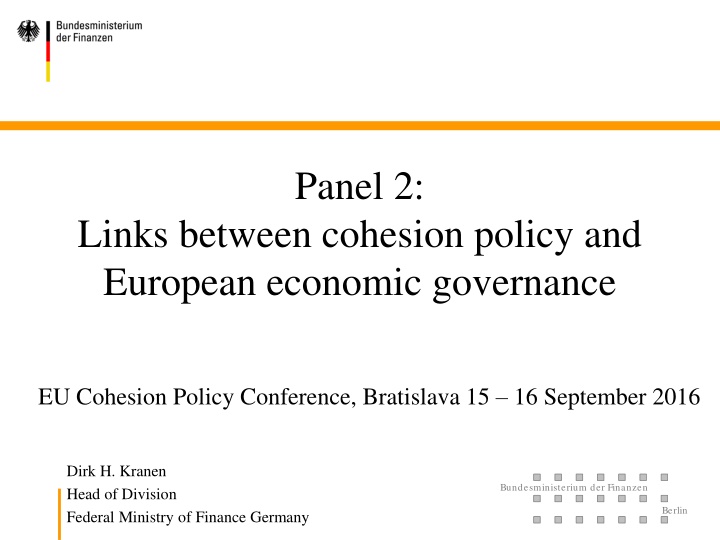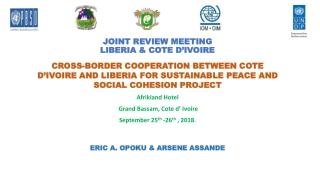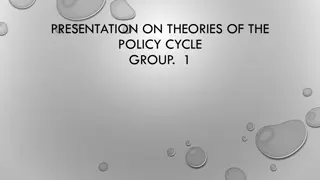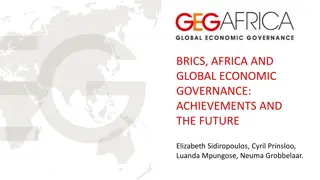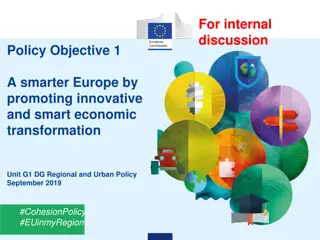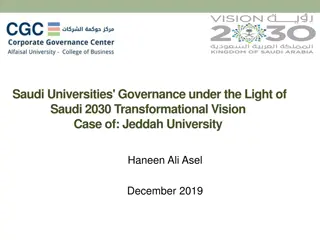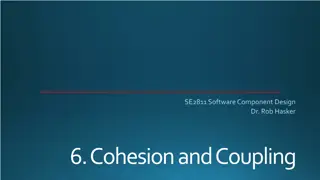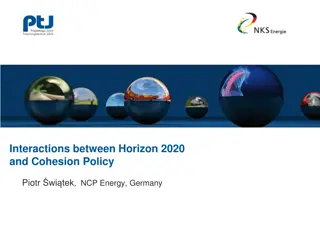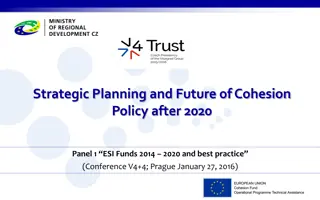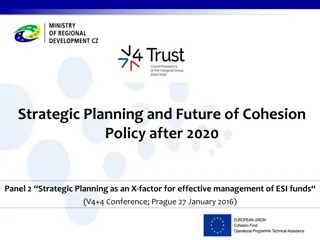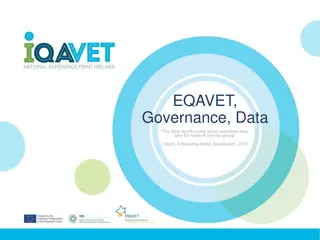Recommendations for Enhancing EU Economic Governance and Cohesion Policy
Explore key recommendations from the EU Cohesion Policy Conference in Bratislava and the Federal Ministry of Finance of Germany. Topics include achieving EU-wide benefits from spending, evaluating the Common Agricultural Policy, and improving budget flexibility. These suggestions aim to align EU spending with public goods provision, comply with treaty objectives, and enhance responsiveness to challenges like the migration crisis.
Uploaded on Oct 02, 2024 | 3 Views
Download Presentation

Please find below an Image/Link to download the presentation.
The content on the website is provided AS IS for your information and personal use only. It may not be sold, licensed, or shared on other websites without obtaining consent from the author.If you encounter any issues during the download, it is possible that the publisher has removed the file from their server.
You are allowed to download the files provided on this website for personal or commercial use, subject to the condition that they are used lawfully. All files are the property of their respective owners.
The content on the website is provided AS IS for your information and personal use only. It may not be sold, licensed, or shared on other websites without obtaining consent from the author.
E N D
Presentation Transcript
Panel 2: Links between cohesion policy and European economic governance EU Cohesion Policy Conference, Bratislava 15 16 September 2016 Dirk H. Kranen Head of Division Federal Ministry of Finance Germany Bundesministerium der Finanzen Berlin
Financial Contributions in 2015 Bundesministerium der Finanzen 2 Berlin
Bundesministerium der Finanzen 3 Berlin
New Priorities in European Spending How to shape the EU-Budget of the Future- Conference in Berlin 12 July 2016 organized by the Federal Ministry of Finance of Germany brought together scientists, delegates of member states and the Commission and the German Parliament Four sessions four recommendations Bundesministerium der Finanzen 4 Berlin
Recommendation How to achieve EU-wide benefits from EU spending? A large fraction of EU-spending is rooted in past negotiations and acted as side payments to achieve consent by member states. This political rationalization notwithstanding the budget is characterized by a lack of provision of European public goods. It is crucial for the European Union to put these goods into their focus and thereby adhere to the principle of subsidiarity. Bundesministerium der Finanzen 5 Berlin
Recommendation Does the Common Agricultural Policy still comply with the spirit of the European treaties? Given its substantial share of EU-spending the Common Agricultural Policy is still a field of key importance for the EU. Yet like all other policy fields the Common Agriculture Policy has to prove its significance for spending priorities in the future. Given concerns that this policy does not comply with the main objectives and is vastly inefficient, this part of the budget offers substantial scope for reforms. Bundesministerium der Finanzen 6 Berlin
Recommendation How to improve the flexibility of the EU budget? EU should be able to react effectively and quickly to unforeseen events like the current migration challenge. Increasing the flexibility should be done in a way that does not harm the function of the budget. Bundesministerium der Finanzen 7 Berlin
Recommendation How EU Cohesion Policy might contribute to the implementation of countryspecific recommendations The cohesion policy should be linked with the country- specific recommendations. This would strengthen the effectiveness of cohesion policy and the overall consistency of the fiscal and economic policy of the European Union. Bundesministerium der Finanzen 8 Berlin
Existing links between cohesion policy and European Semester Fosters European added value of EU expenditures Ex ante conditionality Macro-economic conditionality => correct approach (in principle) Bundesministerium der Finanzen 9 Berlin
How to improve the link? Weak points in construction: too many objectives too much discretion Berlin recommendations (12 July 2016): strenghtening the link: less objectives and strict application of macro-economic conditionality harmonization of csr and use of cohesion money Bundesministerium der Finanzen 10 Berlin
Thank You! Bundesministerium der Finanzen 11 Berlin
